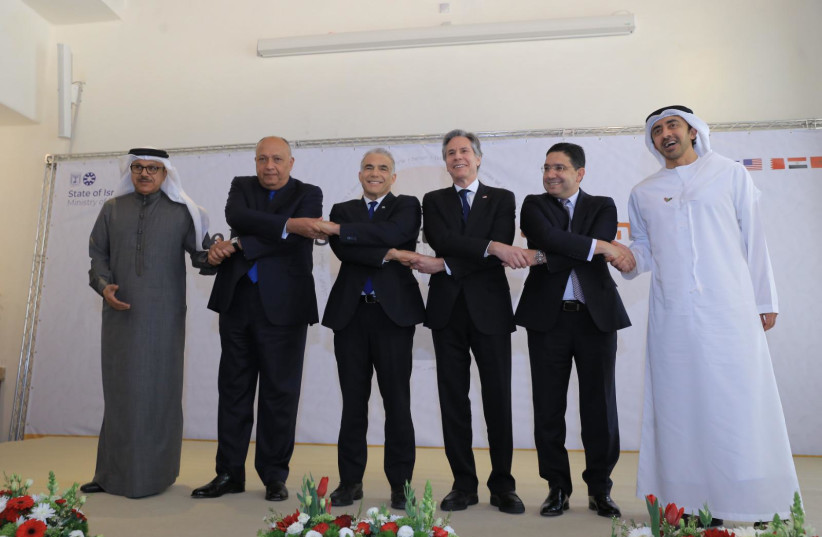Recent reports have indicated that Israel and Arab states have held “unprecedented” and “secret” talks, initiated by the US, according to The Wall Street Journal.
The report says, Israel, the US and Saudi Arabia, along with Egypt and Gulf countries took part in the meetings.
Meanwhile, another report says the US “secretly reviews Israel’s plans for strikes against Iranian targets in Syria” and there is talk of a Middle East “NATO.”
It’s hard to keep up with the various stories, since several weeks ago another article in the WSJ, said Israel and Saudi Arabia had held talks.
And on June 20 it said that Israel “expands operations against Iranian nuclear, military targets.”

The increased tempo of these reports appears to show that Israel-Iran tensions are growing and that the US is working a track on Israel’s ties with the Gulf that includes larger discussions on regional security. Part of this story is public and is known. For instance Israel took part in a Negev Forum meeting, and in Manama in Bahrain. This forum includes Bahrain, Israel, the US, UAE, Egypt and Morocco. There are also the reports of Israel’s talks with Egypt and Saudi Arabia about the Red Sea. Then there are the US-Israel meetings related to Central Command visits. It’s hard to keep track of all the activity being reported.
The emerging picture is that media reports are emphasizing US-Israel-Arab ties, including partnerships in the wake of the Abraham Accords; building on the existing Israel-Egypt and Israel-Jordan ties; and a potential increase in discussions with Saudi Arabia.
Most of these relationships and the perception that Israel and Riyadh have common interests, are issues that have been known for years.
The perception that the Biden administration is solidifying the nascent partnerships is important because it shows that the US is not leaving the region, but wants to have a multilateral relationship that includes Israel, the US, UAE, Bahrain, Egypt, and potentially Saudi Arabia and Jordan as well as Morocco, Sudan and, further afield – Greece, Cyprus and India.
This big arc of countries enjoys common views on several issues. But it is not a “NATO” and it is not an anti-Iran alliance.
Reports on air defense talks and Iran drone and missile threats are about issues that Israel and the Gulf and the US have long been concerned. For example, Iranian-backed Houthis have used drones and missiles against Saudi Arabia for years.
HOWEVER, paired with “leaks” or details about Israel’s confrontation with Iran in Syria, increased Iranian threats to US forces in Iraq and Syria and talk of the US reviewing Israeli actions in Syria; what emerges is a much stronger partnership of the US and Israel.
This is very different from the way some reports have spoken of the Iran issue as a potential stumbling block for Israel and US ties, because on the road to the Iran deal, Israel’s former prime minister Benjamin Netanyahu was a tough critic of the Obama administration.
Key Obama allies like then secretary of state John Kerry were quoted as saying Israel-Gulf ties wouldn’t happen without a Palestinian peace deal.
There is a debate on whether Israeli strikes in Syria reflect US policy and whether Iran might attack US forces in response. That debate, which lasted into the first years of the Trump administration, was put to rest when the US began to support Israel’s actions in Syria.
This matters now because of Israel’s elections. Netanyahu’s combative relationship with the Obama administration could overshadow relations with the current democratic administration. What matters is that media leaks during the Obama administration tended to focus on the Iran issue. Today it is less clear.
Will the US come up with some new agreement in the wake of recent talks Iran held in Doha which Iran says were positive?
The campaign between the wars
Meanwhile, the “campaign between the wars”, Israel’s opposition to Iran’s entrenchment in Syria, may have reached a new stage as former prime minister Naftali Bennett hinted at the new “octopus” doctrine. The doctrine means going after the head of the Iranian threat. Recent reports suggest the IRGC has replaced its intelligence chief. If the campaign heats up, or if Iran increases enrichment, or if a new Iran agreement is on the table, the situation in the region could escalate.
The importance then of new security talks with the US and the Gulf, including the different tracks related to air defense and also Syria, could matter more than ever. This could pave the way for a stronger regional security foundation. Israel’s focus on new laser defenses, its Chariots of Fire drill and work with Central Command, all come into play here.
The overall question, as we look at the recent reports about US-Israel talks, Israeli strikes in Syria and regional security talks suggests a much more healthy relationship between the US and Israel, as well as between the US and other Middle East allies.
If once the US had to follow two tracks, one for the Middle East and another for US-Israel relations, now there is cross pollination and the relationship may grow beyond the sum of its parts.
